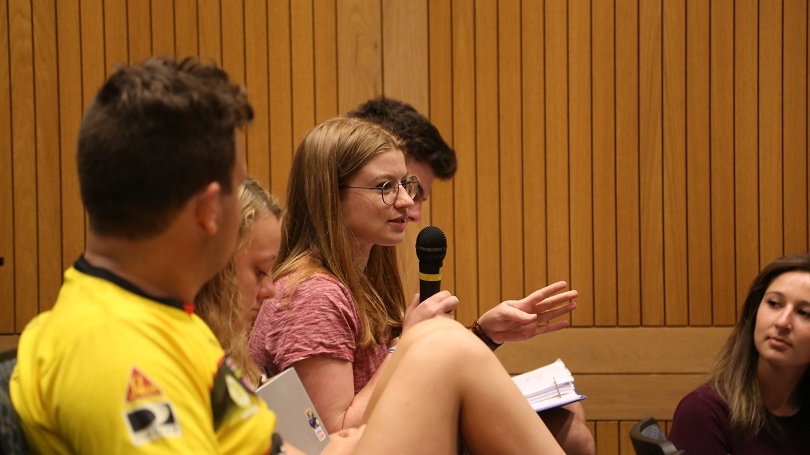
- Public Policy
- Leadership
- Funding
- News & Events
- About the Center
Back to Top Nav
Back to Top Nav
Back to Top Nav
Back to Top Nav
R. Shep Melnick, the Thomas P. O’Neill, Jr. Professor of American Politics at Boston College, delivered a public lecture titled “Why Has Title IX Become So Controversial?” at the Rockefeller Center this past spring. During his talk, he focused on the purpose of federal regulation in removing institutional barriers to educational opportunity as well as the shifting focus on equality and gender roles, closely addressing issues of gender, sexuality, stereotyping and federal policy.
R. Shep Melnick began studying Title IX, which prohibits discrimination on the basis of sex in any federally funded education program or activity, for a single chapter in his book on the growing “Civil Rights State” in the United States about nondiscrimination rules encompassing race, sex, disability, age and national origin. The regulatory apparatus operates differently than other programs to establish and enforce nondiscrimination laws, especially concerning the ways in which rules are made and the courts are involved. What he found, however, opened the gateway for a deeper study on the intersection of law, sex, gender politics, and public policy.
Title IX states that no person in the United States shall, on the basis of sex, be excluded from participation in, be denied the benefits of, or be subjected to discrimination under any education program or activity receiving federal financial assistance. Here, Melnick believes that the overreach of ambiguous language and federal government is detrimental.
“On the basis of very little input, the federal government has established a set of uniform national rules, procedures and definitions without really knowing what we are getting into,” he added. “Now, we’re trying to learn from that experience and modify it as we go along, so that we provide due process, do not unnecessarily infringe upon freedom of speech, so that we allow colleges to experiment with different approaches. If we thought a little bit more about that at the beginning, we would have had less of the uncertainty and controversies that have emerged in the past five years.”
It is difficult for a small federal agency, such as the OCR (Office of Civil Rights), to issue rules to purport cultural change at every school in the nation, Melnick said. He added that this level of micromanagement is inappropriate and he does not see it ending well with unintended effects and token compliance – “there is a fair amount of arrogance to think that a few unilateral orders from a federal agency will do a good job bringing change about.” Melnick also reflected on the ways in which the compliance mechanisms of these institutions are not transparent, demonstrated through various levels of cooperation that are difficult to manage.
Melnick also spoke on the corrupting influences of sports for men as they have been transferred onto women, partly because the NCAA took over both dimensions. These influences include lower admission standards, underperformance in grades, and the cultural tension about “we are not here to be students” due to the huge advantages at large state schools accrued by athletes and that compromise the integrity of the institution.
Melnick is author of The Transformation of Title IX: Regulating Gender Equality in Education (Brookings, 2018) in addition to two books on welfare and regulatory courts. He specializes in the intersection of law, politics, and public policy and is the co-chair of the Harvard Program on Constitutional Government and past president of the New England Political Science Association.
Written by Alexa Green ’19, Rockefeller Center Student Program Assistant for Public Programs
The views and opinions expressed, and any materials presented during a public program are the speaker’s own and do not necessarily represent the views and opinions of the Rockefeller Center or constitute an endorsement by the Center.